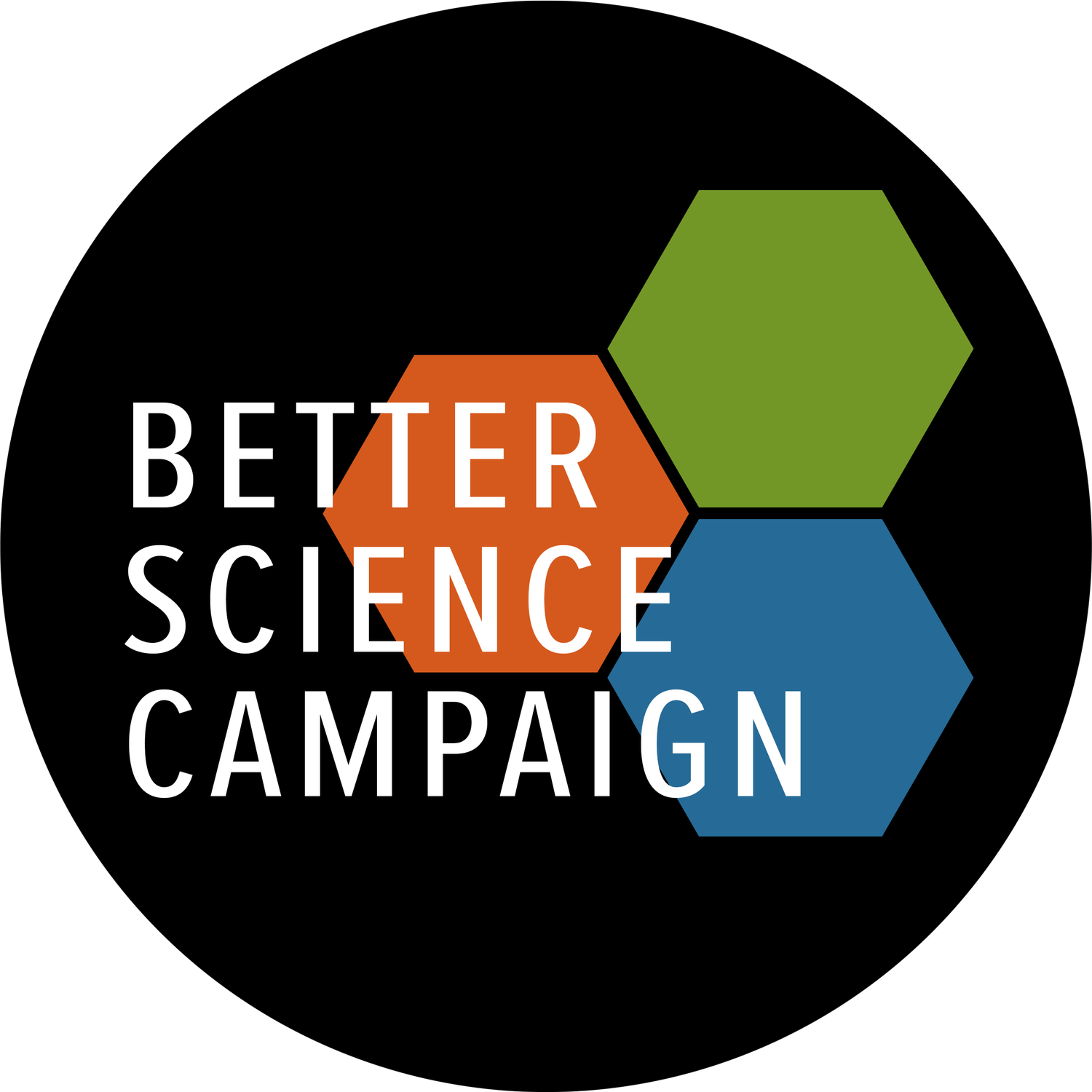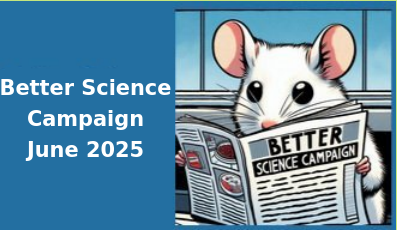BSC June Newsletter
The Better Science Campaign (BSC), is a 501(c)(3) nonprofit organization dedicated to advancing a scientific paradigm that benefits all and protects the vulnerable.
BSC promotes ethical alternatives to animal testing, focusing on collaboration with researchers willing to transition to humane practices. Unlike some groups, we avoid confrontational tactics and emphasize respectful dialogue. Our mission is to work with ethical scientists to eliminate cruel and wasteful animal experiments, prioritizing methods that respect all sentient beings and improve human health. Currently, our efforts are focused on the University of California, Berkeley.
As Animal Testing Labs Shut Down, What Will We Do With All Their Laboratory Animals?
By Ismael Perez
Digital Marketing Specialist of the Better Science Campaign
On May 8th, Congresswoman Rep. Nancy Mace announced that her office is reintroducing Violet's Law, a bill she originally introduced in March 2023. Violet's Law would mandate that federal research facilities release all dogs, cats, primates, guinea pigs, hamsters, and rabbits to animal rescue organizations, sanctuaries, animal shelters, or individuals after the completion of testing. The bill explicitly defines 'suitable for release' as an "eligible animal that has been evaluated and has received a certificate issued by a veterinarian licensed to practice veterinary medicine, certifying that they inspected the eligible animal on a specified date that is not more than ten days before such animal is released, and when so inspected, the eligible animal appeared free of any infectious disease or physical abnormality which would endanger the eligible animal, other animals, or public health."
The bill is cosponsored by 100 representatives and stopped its movement after being referred to the Subcommittee on Livestock, Dairy, and Poultry in April 2023. The reintroduction comes as the Trump administration has ordered a halt to lab testing on animals such as dogs, rabbits, mice, and other animals. Five days before the reintroduction, the National Institutes of Health (NIH) Director Jay Bhattacharya announced on Fox News that the agency had closed its last in-house beagle laboratory on the NIH campus. Violet's Law appears to have a better chance of passing this time around.
Sanctuaries that specialize in rescuing animals from laboratories, such as Kindness Ranch Animal Sanctuary and Freedom Fields, are likely to generate significant revenue if the Trump administration adheres to its directive and Violet's Law is enacted. Kindness Ranch reported that it received more than $ 1.9 million in donations in 2023. Although Kindness Ranch has not conducted an independent audit to confirm its growth in donations, more labs allowing their animals to be rescued can lead to increased funding for animal sanctuaries. The more funding sanctuaries receive, the more they can evolve and provide their animal residents with a better quality of life. Urging our representatives to support Violet's Law and showing support for the Trump administration's orders to halt lab testing on animals are actions everyone can take to promote better animal well-being and more effective science.
The Future is Personalized, Not Porcine
By Diana Navon
CEO/Founder of the Better Science Campaign
On my drivers license, it states that I am an organ donor. When I die that is.
Worldwide, patients wait for an available organ that will help extend their life, and there is a shortage of human organs. In the news, I have noticed that science is trying to address this. Several biotechnology companies are genetically modifying pigs to provide organs for sick humans. Some of the companies that I know about are: Revivicor (Blacksburg, VA),United Therapeutics Corporation (Silver Spring, MD),Recombinetics (St. Paul, MN), and eGenesis (Cambridge, MA). The purpose of their work is to save lives. Pigs are used because their organs are similar to human organs. These animals have been genetically altered to reduce the risk of organ rejection and disease transmission.
It breaks my heart and makes me anxious. This is yet another way that pigs are being exploited for the benefit of humans. Videos of the Revivicor facility show baby pigs in small but colorful pens that include a few toys. Check this out: Revivicor The babies are playful in their small enclosures, but they aren’t outside in the sun on grass or dirt; they are in a lab environment. They can’t roll in the mud, roam or forage. They don’t seem to have access to their mothers who are probably already being inseminated again to grow more babies for this company. The people who create them and care for them consider this to be humane. The reporters in the video don’t seem to grasp the horror of the situation. The smiling visitors gently lift and stroke the adorable infants.
Pigs are very smart and social. Pigs, like humans, care about their own lives. They want to live. They are afraid of pain. They enjoy play. They become attached to their mothers and companions. This is not the best way for these babies to be raised. But it is the best way for them to be raised for organ harvesting.
As a vegan I believe it is unethical to breed, confine, modify, and kill animals for human purposes—even for medical reasons. Sentient beings should not be treated as spare parts. The use of genetically modified pigs for organ transplants is the latest manifestation of the belief that human needs outweigh other animals' right to life. It is not right to kill one individual to save another.
Think about how it would be for us if a superior alien race came to earth and decided to harvest us as food as was portrayed in an episode of the 1950s TV show the Twilight Zone, To Serve Man. To Serve Man (The Twilight Zone) I saw a movie that moved me deeply about raising entities to harvest their organs. The movie was called Never Let Me Go 2010. https://en.wikipedia.org/wiki/Never_Let_Me_Go_(2010_film) Children are cloned to be raised to become organ donors. They grow up resigned to their fate; they can’t escape it, but they want to live and to love. I highly recommend seeing it.
There is another way. We don’t need to use animals for organs, we can grow our own! We now have the scientific ability to grow human tissues and even organs using a person’s own cells. Through techniques like stem cell reprogramming, 3D bioprinting, and tissue engineering, researchers are working to create personalized organs that eliminate the need for immune suppression and the tragedy of waiting lists. These are organs made for people, from people—no cross-species rejection, no need for genetic modification, and no sentient animal has to die.
These technologies aren’t science fiction. They are already being tested and refined in labs around the world. What they need is investment, urgency, and the moral clarity to pursue solutions that don't sacrifice other lives for our own.
It’s time we stopped pretending that the only way to save human lives is to take the lives of animals. The future of medicine is not in the pig barn—it’s in the lab, where we can build a world that values all life, not just human life.



